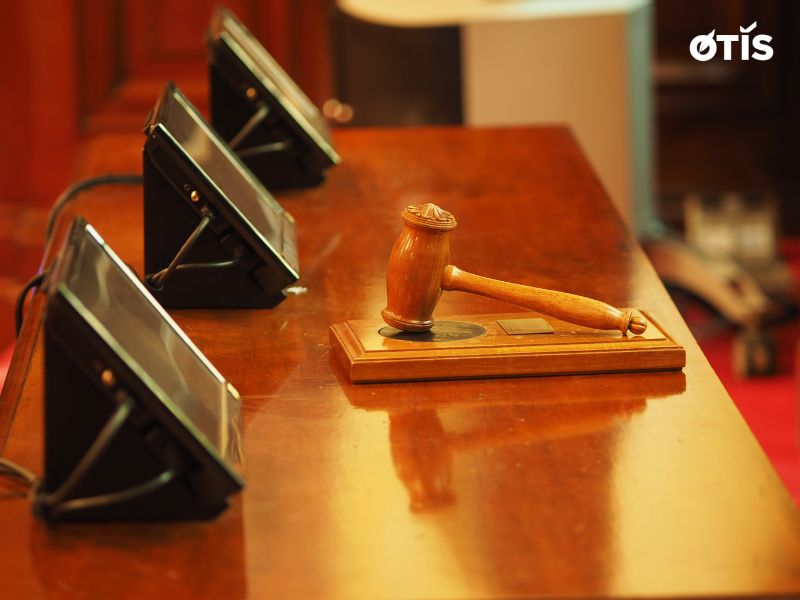Buying and selling goods is a daily activity in social life. In fact, a contract for the sale of goods has many potential risks and can easily lead to disputes. So, if there is a dispute over contracts for the sale of goods, how to handle it? What methods does the law prescribe to resolve a contract of sale of goods? Let’s find out with OTIS LAWYERS in the article below!
Legal Grounds
Commercial Law 2005
Civil Procedure Code 2015
Law on Commercial Arbitration 2010
Decree 22/2017/ND-CP
What is a contract of sale of goods?
Purchase and sale of goods is a commercial activity whereby the seller is obliged to deliver the goods, transfer the ownership of the goods to the buyer and receive payment; the buyer is obliged to pay the seller, receive the goods and take ownership of the goods as agreed.
A contract for the sale of goods is an agreement between parties whereby the seller transfers ownership of the property to the buyer and the buyer pays the seller. To ensure economic safety, each transaction is usually drafted and signed by the parties to the terms of the sale and purchase contract, the parties specifying the content as well as anticipating possible risks.
What is a dispute over a contract of sale of goods?
Dispute over contracts for the sale of goods are conflicts, disagreements or conflicts between parties in the improper performance or failure to perform the rights and obligations recorded in the contract.
Disputes may arise from the content of the contract, the interpretation of the contract, the rights and obligations of the parties in the contract, the liability to compensate for damage caused by the breach of the contract.
Common disputes over contracts for the sale of goods
Disputes over contracts for the sale of goods often occur with the following contentious contents:
a, Dispute over the contracts for the sale of goods due to the seller’s delay in delivery

Article 37 of the Commercial Law 2005, revised 2019 stipulates as follows: The seller must deliver the goods at the time of delivery as agreed in the contract. Where there is only an agreement on the delivery term without specifying a specific delivery time, the seller has the right to deliver the goods at any time within that time limit and must notify the buyer in advance. If there is no agreement on the time limit for delivery, the seller must deliver the goods within a reasonable time after the conclusion of the contract.
The late delivery of goods by the seller may affect the business activities of the buyer, leading to disputes.
b) Disputes over contracts for the sale of goods where the seller delivers goods of the wrong type and quantity as committed in the contract signed by both parties
The seller must deliver the goods and documents as agreed in the contract in terms of quantity, quality, packing and preservation methods and other provisions in the contract.
The parties often dispute about goods that are not for the right subjects, the quantity of goods as agreed, about the wrong quality of goods, which do not meet the standards, and disputes over the units of calculation. This may be because the provisions in the contract are not specific and detailed leading to misunderstandings or because one party takes advantage of loopholes to fail to perform their obligations. In order to limit disputes, when signing a contract, the two parties need to specific agreement on:
- Object of the contract
- Goods quality, quantity, weight
- Technical specifications and applicable criteria.
c, Disputes caused by the buyer’s breach of payment obligation
Article 50 of the 2005 Commercial Law, amended in 2019 stipulates as follows: The buyer is obliged to pay for the purchase and receive the goods as agreed. The buyer must comply with the payment methods, make the payment according to the agreed order and procedures and according to the provisions of the law… The buyer still has to pay for the purchase in case the goods are lost, loss or damage after the time the risk is transferred from the seller to the buyer, except for the case of loss or damage caused by the seller’s fault.
The buyer’s delay in payment obligations due to the subjective will of the buyer will lead to disputes and conflicts with the seller. Consequences of this violation may lead to the seller’s unilateral termination of the contract, or liability for contract penalties, interest on late payment to the buyer…
d, Due to non-contractual damages
Article 303 of the Commercial Law stipulates the conditions for arising compensation liability as follows:
- There is a breach of contract
- Has actual damage occurred
- The breach of contract is the direct cause of the damage.
When liability for damage arises, the parties often have disputes in determining the level of compensation for the aggrieved party, especially liability to a third party.
Settlement of disputes over contracts for the sale of goods
Settlement of disputes over contracts for the sale of goods by negotiation
Negotiation is a method of dispute resolution through which the disputing parties discuss together, self-negotiate to remove arising disagreements to eliminate disputes without the assistance or judgment of any party. which third.
This method of dispute resolution is implemented through the disputing parties meeting to discuss and agree to resolve arising disagreements without the presence of a third party to assist or judge. decide.

The negotiation process between the parties is also not bound by any legal principles or stereotypes of the law on dispute settlement procedures.
The implementation of the results of the negotiation depends entirely on the voluntariness of each disputing party without the disputing party without any legal mechanism to ensure the enforcement of the agreement of the parties in the process. negotiation process.
Settlement of disputes over contracts for the sale of goods by mediation
According to the provisions of Clause 1, Article 3 of Decree 22/2017/ND-CP: Commercial mediation is a method of resolving commercial disputes agreed upon by the parties and assisted by a commercial mediator as a mediator. dispute resolution assistance.
Mediation at a mediation center (commercial mediation)
Advantage:
- Not constrained, save time and cost
- Information of the parties is kept confidential, unless otherwise agreed by the parties in writing or provided for by law.
Disadvantages:
The mediator may not make decisions that bind or impose on the parties when resolving a dispute. According to the provisions of Article 9, Article 14 of Decree 22/2017/ND-CP, the mediator must respect the agreement of the parties. Therefore, the mediation at the Commercial Mediation Center is only an intermediary, there is currently no mandatory regulation on mediation, so the commercial mediation center has no jurisdiction. This is the biggest drawback when choosing the mediation method at the Mediation Center.
Mediation by Commercial Arbitration
Advantage:
- Information of the parties is absolutely confidential
- Enterprises can agree on a suitable time, place, arbitrator, language, dispute resolution law…
Disadvantages:
- High cost
- The enforcement of the Arbitration is not as high as that of the Court. Because the arbitral award is final, in the event that the Arbitrator makes an incorrect award, it will cause undue consequences for the parties. The parties can request to annul the award at the Court, but it will lead to a loss of time, cost and effort
Procedure:
- The plaintiff files the lawsuit petition and accompanying documents and evidence;
- After the Plaintiff files a lawsuit to the Arbitration, the Respondent will submit a self-defense or counter-suit against the plaintiff and send it to the Commercial Arbitration Center;
- The commercial arbitration center shall establish an arbitration council to open a dispute settlement session;
- After the end of the dispute settlement session, the Arbitral Tribunal shall issue an arbitral award by majority vote.
Settlement of disputes over contracts for the sale of goods by Court
Advantages and disadvantages
Compared with the above dispute resolution methods, dispute settlement by courts is considered to have strict procedures, state power, high enforcement value and low cost. However, the settlement by the Court takes a long time, affecting the work of the parties.

Procedure:
- The complaining party will send a lawsuit petition to the district court; where the respondent is an individual residing or an organization having its head office;
- Within 07 working days from the date of receiving the lawsuit petition; if the dossier is valid, the competent court will issue a notice of advance payment of the court fee to the applicant;
- After the petitioner has paid the court fee advance, the competent court will accept the case;
- The court shall handle the case according to civil procedures;
- The court issues a judgment or decides to settle the case.
Above is our advice on the dispute over the contracts for the sale of goods. We hope that the article will be a useful reference for readers; when they want to learn about contracts for the sale of goods.
OTIS LAWYERS. Contract dispute settlement consulting service
OTIS LAWYERS is always proud to be a professional unit in the field of consulting and resolving contract disputes. With a team of highly qualified lawyers, extensive experience and dedication to clients; we believe that we will provide you with the best, most professional service; reasonable cost and time. Complete the process as quickly as possible. We commit that all customer information is absolutely confidential and customer interests always come first.
For any questions or comments, please contact:
OTIS AND PARTNERS LAW FIRM
Office address: K28 – Group K, Lane 68 Trung Kinh, Yen Hoa Ward, Cau Giay District, Hanoi
Email: info@otislawyers.vn
Hotline: 0987748111


 Tiếng Việt
Tiếng Việt 한국어
한국어 中文 (中国)
中文 (中国)